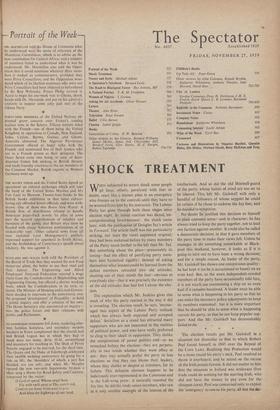Portrait of the Week— MR. MACMILLAN told the House of
Commons what he understood were the terms of reference of the Monckton Commission, which is to advise on the new constitution for Central Africa; and a number of members failed to understand what it was he understood. Mr. Macmillan also told the Oppo- sition that it could nominate whatever three mem- bers it wished as commissioners, provided they were Privy Councillors; and the Opposition won- dered which of its likeliest nominees who were not Privy Councillors had been objected to beforehand by Sir Roy Welensky. Prince Philip arrived in Accra to begin his one-week visit to Ghana, shook hands with Dr. Nkrumah, and put on his admiral's uniform to inspect some jolly jack tars of the Ghana Navy.
*
FORTY-NINE MEMBERS Of the United Nations ex- pressed grave concern over France's coming nuclear tests in the Sahara. Fifteen nations sided with the French—one of them being the United Kingdom, in opposition to Canada, New Zealand, India, Ceylon, Burma, Guinea and Ghana. Australia abstained. The Algerian Provisional Government offered to begin talks with the French. and nominated five of their leaders who are in a French prison as their delegates. The Outer Seven came into being, 'in spite of Scan- dinavian frozen fish sticking in British throats. and made friendly overtures to the six members of the Common Market. British exports to Western Germany went up.
• *
THE SOVIET UNION and the United States signed an agreement on cultural exchanges which will take the band of the United States Marines and My Fair Lady to Moscow. Twenty-four books in the British books exhibition in that same culture- loving city offended Soviet officials. and were with- drawn. One of them was Brave New World. A British firm of distributors refused to handle American paper-back novels `to allay in some part the natural apprehension of retailers and members of the public that Britain may soon be flooded with cheap American publications of an undesirable type.' Other cultural news from all over included Lord Montgomery's publicly expressed support for apartheid in South Africa, and the Archbishop of Canterbury's speech about adultery. He was against it.
SCOTLAND AND WALES both told the President of the Board of Trade that they wanted the new Ford motor-car plant, the better to use their steel and their labour. The Engineering and Allied Employers' National Federation rejected a wage claim from the Confederation of Shipbuilding and Engineering Unions, but offered a shorter working week, which the Confederation, in its turn, re- jected. The Minister of Housing and Local Govern- ment decided to intervene in the controversy over the proposed 'development' of Piccadilly : to hold a public inquiry and offer a solution of his own. The Home Secretary also announced an inquiry— into the police forces and their relations with public and Parliament, * NN 1.1)INIIURCiii I I NEMENT fell down, rendering nine- teen families homeless, and secondary modern teachers in Essex complained that the church hall and British Legion but in which they had to
teach were too noisy, dirty, unventilated and insanitary for teaching in. The Shah of Persia became engaged to be married, for the third time. The Queen and the Duke of Edinburgh celebrated their twelfth wedding anniversary by going for a ride on M I, the 'shoulders' of which, a jury has decided, are too soft; and when Mr. Marples opened the new two-mile Ingatestone by-pass a choir sang a Hymn for Road Safety and Courtesy. composed by the rector: 0 God of speed, Whose angel host Fly with swift pace at Thy comm Ind, Control our haste from post to post And bless the highways of our land.


























































 Previous page
Previous page